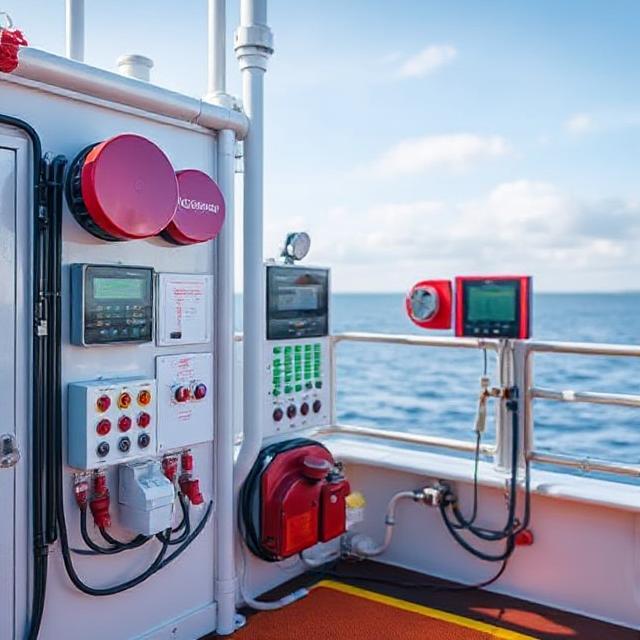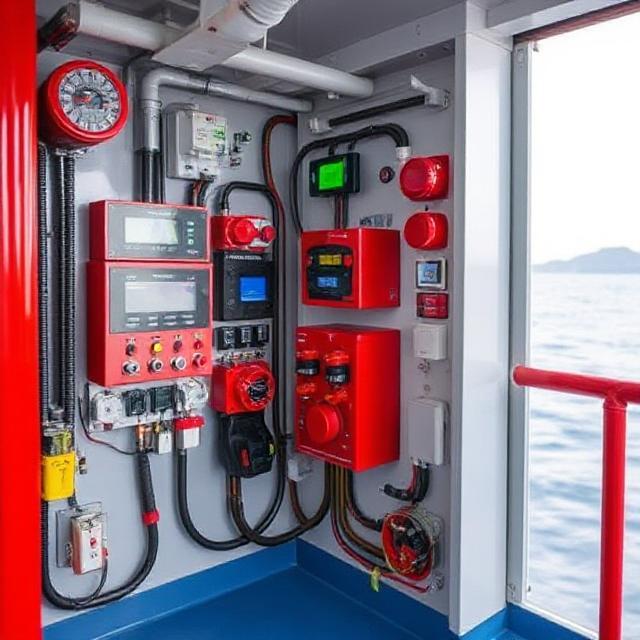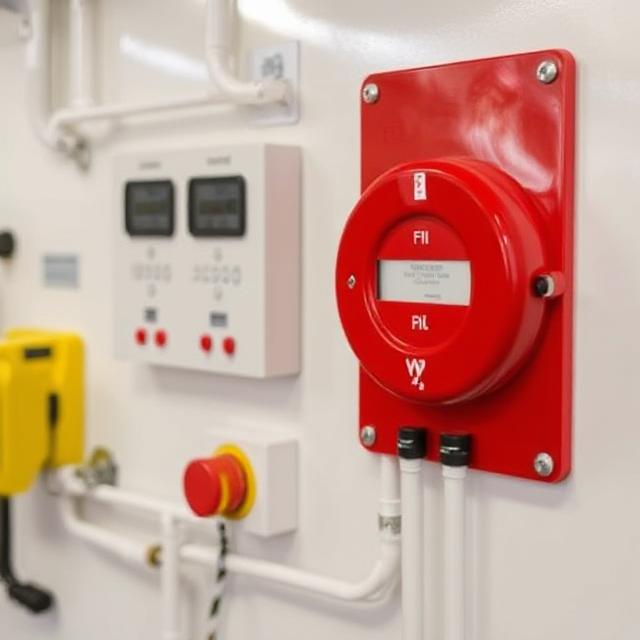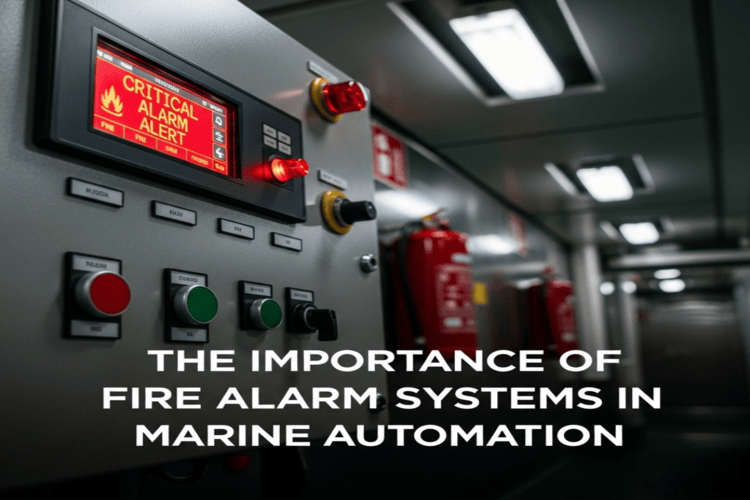In the world of marine automation, safety is always the number one priority. Ships and offshore platforms operate in complex environments with highly flammable materials, high voltage systems, and extreme weather conditions. One of the most essential safety components in this space is the fire alarm system.
A marine fire alarm system is not just a part of equipment — it’s a vital safety solution that protects people, assets, and operations. Whether it’s a cargo ship, oil rig, passenger vessel, or naval ship, having a reliable and automated fire detection system can prevent loss of life, damage to equipment, and long downtimes.
Let’s dive deeper into why these systems are so important and how they support marine automation.
What Is a Marine Fire Alarm System?

A marine fire alarm system is a specialized fire detection and alert system designed to operate in the unique conditions found at sea. It includes detectors, control panels, alarms, and communication devices that work together to:
- Detect fire or smoke early
- Alert the crew and passengers
- Activate emergency protocols
- Communicate with ship automation systems
These systems are built to withstand vibration, humidity, corrosion, and temperature fluctuations commonly experienced in marine environments.
Role of Fire Alarm Systems in Marine Automation
Modern ships and offshore platforms are increasingly automated. Automation helps in improving efficiency, reducing manual errors, and ensuring continuous monitoring. But automation also means that humans may not be physically present to notice a fire in its early stage. This is where automated fire alarm systems play a vital role.
They are fully integrated into the ship’s automation architecture and can:
- Monitor multiple zones at once
- Instantly alert remote-control centers
- Automatically shut down electrical or fuel systems
- Trigger fire suppression systems
- Provide real-time updates to bridge or engine room personnel
In short, fire alarm systems work hand-in-hand with marine automation to improve onboard safety.
Key Features of Marine Fire Alarm Systems

1. Smoke and Heat Detection
- These systems use heat sensors, flame detectors, and smoke detectors designed for harsh marine conditions.
2. Zonal Monitoring
- Ships are divided into zones. Fire alarm systems can pinpoint the exact zone of fire or smoke, helping with fast response.
3. Alarm Integration
- Audible and visual alarms are triggered in affected zones and the control room.
4. Control Panels
- User-friendly panels display the status of all detectors and enable crew members to take quick action.
5. Automation Compatibility
- These systems can integrate with marine automation systems to perform automated safety tasks like closing ventilation or shutting fuel valves.
6. Redundancy for Reliability
- Many systems have backup power and communication lines to ensure functionality even during electrical failure.
Why Are Fire Alarm Systems So Crucial in the Marine Industry?
1. Early Fire Detection Saves Lives
At sea, you don’t have access to quick external emergency response. If a fire breaks out, your ship’s crew is your only line of defense. An early warning system gives them enough time to act before things go out of control.
2. Reduces Equipment and Cargo Damage
Fires in engine rooms or cargo holds can cause major damage and cost millions. A fire alarm system helps detect the threat early and can automatically activate fire suppression systems, minimizing the impact.
3. Complies with Marine Safety Regulations
International Maritime Organization (IMO) and SOLAS regulations require vessels to have certified fire detection systems. A reliable fire alarm system ensures your vessel remains compliant.
4. Enhances Crew Confidence
Crew members working in hazardous environments feel safer when they know fire detection is handled by smart systems. This leads to better productivity and morale.
5. Protects Against Electrical Hazards
Many marine fires are caused by short circuits, overloaded wiring, or faulty machinery. Fire alarm systems are the first line of defense against such incidents.
Applications of Fire Alarm Systems in Marine Vessels
Fire alarm systems are used in all types of marine vessels and offshore structures, including:
1. Cargo Ships
- To monitor engine rooms, cargo holds, and control rooms.
2. Cruise Ships
- To protect passengers and crew across multiple decks and cabins.
3. Oil Tankers
- To prevent fires due to flammable liquid leaks and electrical faults.
4. Naval Ships
- For mission-critical fire protection and damage control.
5. Offshore Oil Platforms
- To safeguard high-risk environments with automation integration.
Benefits of Integrating Fire Alarm Systems into Marine Automation
1. Real-Time Monitoring
Fire alarm systems continuously monitor ship areas and send real-time data to the control room or bridge. This lets the crew take immediate action based on accurate information.
2. Automated Responses
When a fire is detected, the system can:
- Shut off fuel supply
- Close fire doors
- Start ventilation extraction
- Trigger sprinklers or CO₂ systems
This rapid, automated action prevents escalation and saves valuable time.
3. Reduced Human Error
Automation ensures that no manual steps are skipped. Even if the crew is distracted or unavailable, the system acts instantly.
4. Data Logging for Analysis
Modern fire alarm systems store logs and data. This helps in post-incident investigation and safety audits.
5. Centralized Safety Management
With marine automation, multiple safety systems — including fire, gas, and security alarms — can be managed from a central location.
Future of Marine Fire Alarm Systems
With advancements in AI, IoT, and smart sensors, future fire alarm systems will be even more precise. Some key trends include:
- Wireless detectors for easier installation
- AI-based smoke recognition
- Remote alarm management via apps
- Integration with onboard CCTV and GPS
- Predictive maintenance alerts
As marine automation evolves, fire safety technology is evolving too.
Why Choose a Smart Fire Alarm System?

Here’s a quick recap of the key benefits:
- Saves lives with early detection
- Prevents major damage and costs
- Supports automatic emergency action
- Builds crew confidence and trust
- Keeps you compliant with marine safety rules
- Works 24/7, even when you're not watching
Advancing in a marine-grade fire alarm system is not optional — it’s essential.
In today’s automated marine environment, safety cannot be left to chance. Fire alarm systems play a critical role in detecting threats early, automating responses, and protecting both people and property.
By integrating smart fire detection with your marine automation system, you create a safety-first ecosystem where technology and crew work together. Whether you're operating a large cargo vessel, oil rig, or luxury cruise ship — the value of a well-maintained fire alarm system cannot be overstated. Always choose certified, reliable, and intelligent fire alarm systems designed specifically for the marine industry.

